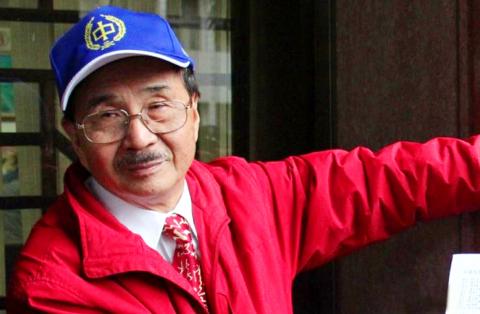A 25-minute investigative documentary aired by Qatar-based al-Jazeera TV has shed some light on how pro-unification groups operate in Taiwan, including by reportedly paying people to attend events and asking the police for the names of independence advocates.
The documentary was produced by Lynn Lee (李成琳) and seeks to draw attention to activities of pro-unification groups in Taiwan, most notably the Concentric Patriotism Association (CPA, 愛國同心會) and the China Unification Promotion Party (CUPP), whose members have grabbed headlines by attacking independence advocates and Falun Gong members staging a sit-in outside Taipei 101.
The network sent an undercover reporter posing as a Chinese visitor to Taiwan in an attempt to infiltrate the CPA.

Photo: Chen Wei-tse, Taipei Times
During the reporter’s conversations with CPA executive director Zhang Xiuye (張秀葉), a Chinese immigrant, Zhang told him that the association paid people between NT$800 and NT$900 per day to wave the national flag of the People’s Republic of China.
Zhang told the reporter that it is illegal to take money from China, but it is legal to accept money from China-based Taiwanese businesspeople, such as CPA head Zhou Qinjun (周慶峻), who she said would often receive “special care” from the Chinese government.
“Authorities in China know which businesses support unification and they will do their best to make sure you do not lose money,” Zhang told the reporter.
The CPA is very careful when recruiting people, requesting that they show their Chinese identification cards, apparently out of fear that members might disclose its activities to outsiders, the documentary said.
“I don’t trust Taiwanese. I only trust Chinese, because as Chinese we all have relatives in China,” Zhou said. “You cannot disclose what we do here to outsiders. If you do that, you might not be affected, but your relatives in China will get hurt.”
The researcher also filmed a telephone conversation between Zhou and what appeared to be a Taiwanese police officer, in which the CPA head asked the officer for a list of names of people who support independence at his precinct.
“First, I hope to get a list of independence supporters. Second, I’m sending him a warning: Don’t think about being pro-independence or I’ll come after you,” Zhou said after the telephone call.
As for the operations of the CUPP, a CPA member said that triads were using the party to “whitewash” their reputations.
“Right now, all kinds of triads are in the CUPP. Why have they joined the party? There is only one reason: to whitewash their reputations,” the member said. “They can have a sign that says they’re a CUPP branch office, but inside it is a triad branch.”
CUPP founder Chang An-le (張安樂), the former Bamboo Union (竹聯幫) gang leader known as the “White Wolf,” is facing investigations for allegedly receiving funding from China to carry out destabilizing activities in Taiwan.
When contacted yesterday, National Police Agency officials said they needed to verify the details of the al-Jazeera report and could not yet respond to the allegations.
Mainland Affairs Council Deputy Minister Chiu Chui-cheng (邱垂正) said that while Taiwan is a democratic and free nation where different political stances are respected, the council opposes the use of violence or coercive means for any political causes.
Additional reporting by Jason Pan

CHAOS: Iranians took to the streets playing celebratory music after reports of Khamenei’s death on Saturday, while mourners also gathered in Tehran yesterday Iranian Supreme Leader Ayatollah Ali Khamenei was killed in a major attack on Iran launched by Israel and the US, throwing the future of the Islamic republic into doubt and raising the risk of regional instability. Iranian state television and the state-run IRNA news agency announced the 86-year-old’s death early yesterday. US President Donald Trump said it gave Iranians their “greatest chance” to “take back” their country. The announcements came after a joint US and Israeli aerial bombardment that targeted Iranian military and governmental sites. Trump said the “heavy and pinpoint bombing” would continue through the week or as long

TRUST: The KMT said it respected the US’ timing and considerations, and hoped it would continue to honor its commitments to helping Taiwan bolster its defenses and deterrence US President Donald Trump is delaying a multibillion-dollar arms sale to Taiwan to ensure his visit to Beijing is successful, a New York Times report said. The weapons sales package has stalled in the US Department of State, the report said, citing US officials it did not identify. The White House has told agencies not to push forward ahead of Trump’s meeting with Chinese President Xi Jinping (習近平), it said. The two last month held a phone call to discuss trade and geopolitical flashpoints ahead of the summit. Xi raised the Taiwan issue and urged the US to handle arms sales to

State-run CPC Corp, Taiwan (CPC, 台灣中油) yesterday said that it had confirmed on Saturday night with its liquefied natural gas (LNG) and crude oil suppliers that shipments are proceeding as scheduled and that domestic supplies remain unaffected. The CPC yesterday announced the gasoline and diesel prices will rise by NT$0.2 and NT$0.4 per liter, respectively, starting Monday, citing Middle East tensions and blizzards in the eastern United States. CPC also iterated it has been reducing the proportion of crude oil imports from the Middle East and diversifying its supply sources in the past few years in response to geopolitical risks, expanding

Pro-democracy media tycoon Jimmy Lai’s (黎智英) fraud conviction and prison sentence were yesterday overturned by a Hong Kong court, in a surprise legal decision that comes soon after Lai was jailed for 20 years on a separate national security charge. Judges Jeremy Poon (潘兆初), Anthea Pang (彭寶琴) and Derek Pang (彭偉昌) said in the judgement that they allowed the appeal from Lai, and another defendant in the case, to proceed, as a lower court judge had “erred.” “The Court of Appeal gave them leave to appeal against their conviction, allowed their appeals, quashed the convictions and set aside the sentences,” the judges